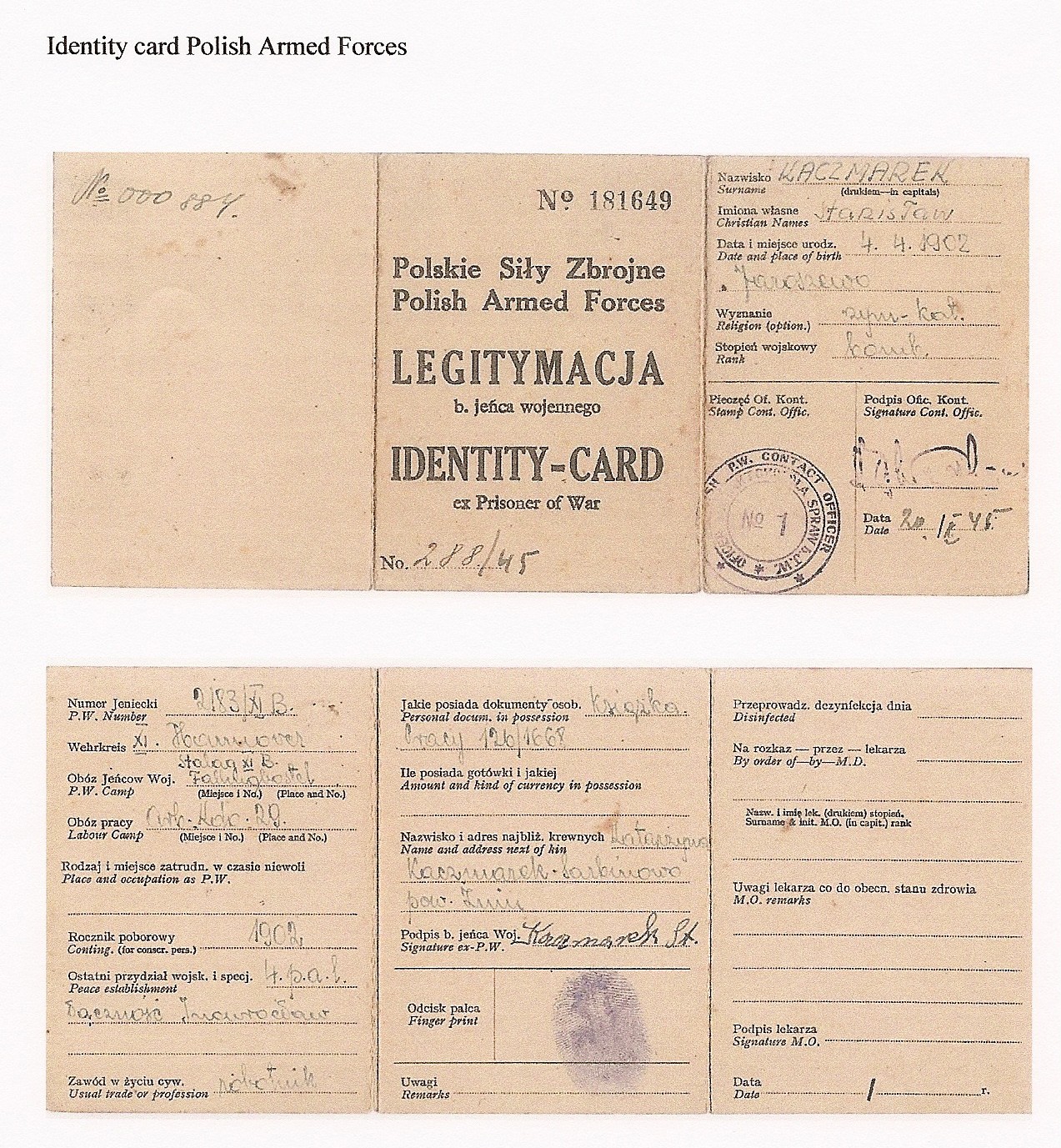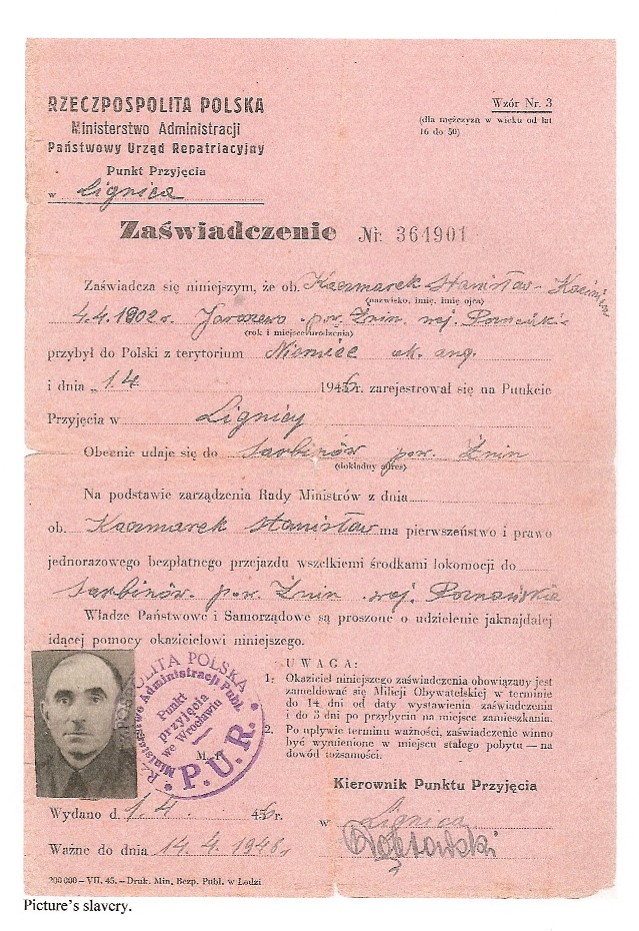 |
 |
 |
| September 1939 War Years | Post Cards from POW Camp | Prison Camp Documents |
 |
 |
|
| Polish Army ID Papers | Polish Occupation ID 1948 |
Photo's of the Kaczmarek Family of Znin PL
A wartime memories of Stanislaw Kaczmarek, including the (Polish) September Campaign of 1939 and the time of war.
Deciphered and elaborated on the basis of documents and oral traditions by Krzysztof Kaczmarek , Henry’s son the grandson of Stanislaw.
Znin, PL 02 26 2008
Stanislaw Kaczmarek, was born April 4, 1902 in Jaroszewo, and was raised in lived in Sarbinowo. His wartime travels beginning in August 24, 1939 to April 1, 1946 began in Inowroclaw, Torun, Wabrzezno, Jablonowo Pomorskie, Nowy Mlyn, Swiecie nad Osa, Sochaczew, Zychlin, Sobota, Piatek, Gieczno ( September 18. 1939 captured, Hansdorf, Forllingbistel, Bucholz (near Bremen, north-east).
On August 24, 1939 Staninslaw was conscripted into the 4th battalion, of the 4th light artillery regiment in Inowroclaw (the 4th infantry was a division of the Pomerania Army). The battalion commander was second lieutenant Ojko. Officers: second lieuntenants Ostrowski and Stasinski, officer cadet Mierzwinski. The liasion officer was corporal Matuszak, Blarzak, service Michalak, Grajkowski and Kaczmarek. Coachmen were Karalewski, Pioterek, Wisniewski from Cerekwica, Kucharek from Turza (friends from other patrols)
“In the words of Stanislaw” on the 24th, 25th and 26th of August there were preparations for marching to the front . On the 26 of August, Saturday evening, we marched out towards Torun, through Gniewkowo. The first stop was on Sunday the 27 August in the forest near Suchatowka, I was supposed take care of two horses. In the evening, we went on marching, then we went through Torun (it took us an hour) to reach Kowalewo. Behind Kowalewo, on Monday 28 August we camped in the forests. In the evening we went on marching, then we ran out of water for horses. On Tuesday August 29, we were lying in the forest near Wabrzezno, where I met Stach Kruzel (a friend from Sarbinowo).
In the evening, we continued to march towards Jablonowo Pomorskie. There we took up quarters near Kitnowski and began moving forward carefully. Our guns were hidden behind the wall in the garden. Here we started the preparations for the front, fitting the gas masks, we received bandages. In the evening, we took the positions towards Nowy Mlyn. The battalion stood in the shrubbery near the village. From that point we took the fire line to the main observation post. We were working all night and we took the lines To Swiecie, to the commander of the 64th battalion. We ran out of the wire there. Pioterek and I came back for the wire and on the way we met Lt. Lemanski, of the artillery section, 14th infantry division, where we had an argument about saluting and then we went on to the point. I took the wire there and came back to our unit. I was hungry all day. There was nothing to eat or buy there. It was now Thursday, in the evening, and I came back to the point, at about midnight. I was on duty at the telephone machine and then I went to sleep in the barn, on the bags of barley, I was sleeping very well.
Next day, Friday, September 1, 1939 and I woke up at 5 a.m. It was 5.20 a.m when I heard the explosions, about three of them, in a distance about 500 metres. In that moment I believed that it was war, because up then I couldn’t believe that war would really happen. We started running and we took our positions quickly. Kubanek and I, the telephone operators, took the telephone machine on the hill, where we took our place in the trenches with heavy machine guns. Our commander was 2nd Lt Stasinski.
All day Friday and Saturday afternoon it was quiet. We were ordered to change the positions of the battalion and move forward, toward Medrzyce as the enemy was advancing. In the meantime, we were attacked by 10 armored vehicles. Our machine gun was jammed and the Germans fired at us from 3 machine gun positions. Our second lieutenant was wounded and died. About half way to our new positions we were stopped by an unknown officer cadet who was to be our leader. He told us to come back to our original position and we formed a line with his infantry. His name was officer cadet Mierzwinski. He gave us food, as we were almost starving, the kitchen have enough didn’t enough food for all of us. It was now in the evening we were back at our former positions. That night was quiet, but the night before the Germans were shooting on our right and to the front of us.
On Saturday morning the infantry troops postion changed, at about 7.00 o’clock a.m. the enemy started shooting at us and it lasted all day. We were the telephone operators, and our phones were in trouble because the telephones lines were broken and we had to go out from the trenches and repair them. Fortunatly nobody was injured while the Germans were shooting. The mansion in Swiecie was burnt down, as well as the farms on the right.
We were very hungry and the officer cadet told us to go the village and bring back something to eat. I caught a few chickens and brought them to trenches. While I was preparing the chickens, the enemy saw the smoke from the oven and started shooting. I left everything and I went to the trench where it was safer. The German planes were flying over us but they didn’t attack us. In the evening we were battered by the artillery. Every time they fired, they broke our telephone lines. My friend Grajkowski couldn’t find the broken lines and I had to go and search for it. When I found the broken lines, it was very hard to repair and I got an asthma attack and fainted. After I awoke I tried to go back to my battalion but I could not find my army unit. The lieutenant from the 5th battalion told me that they were marching towards Jablonowo Lembark. When the infantry came together, we went on marching. Early in the morning we went through Jablonowo, it was empty. While we were marching, we met a convoy of military vehicles, which were also lost. But at least we didn’t have to go on foot. At noon we went out to look for some horses so we could have something to eat (no luck). Soon after that we found our troops and finally I could get some rest and eat something and return to my position. That night I could sleep enough but as soon as I went to the latrine and I wasn’t quite sleeping when there was an alarm and the withdrawal of troops…?
What happened next? (by Grandson Krzysztof Kaczmarek)
After the battles of Jablonowo Pomorskie, September 1 to 3, there was the withdrawal of troops to the south, near Sochaczew, and there September 18, Stanislaw Kaczmarek took part in the battle of the Bzura River. He also fought in places of Sochaczew, Zychlin, Sobota, Piatek, Gieczno. His troops were surrounded by the enemy and from the oral traditions I know that all of the troops were captured while they were sleeping in the barn.
After he had been captured, he went to the temporary POW camp in Hansdorf, which was near to Stalag XI 6/29 in Fallingbostel. He was given the number 2183. From October to June 1940 my grandfather and other prisoners of war were taken to the slave labor camp in Bucholz. He worked there until June 25, 1940.
He was forced to sign a document and he was released from the Stalag which stated.
“ I, Stanislaw Kaczmarek, have been released from German captivity and am obliged until the final decision of the Employments officer, as a free worker to do everything ordered by the Officer and not to leave my work place without any permission of the Employment office and the Police. Otherwise, I would be punished and imprisoned”
My grandfather was sent to work in Germany, at a werks called Chapkie, in Bucholz Camp No. 5. He stayed there from 25 June 1940 till the end of the war. In October 1945 he was conscripted to the Polish Armed Forces, his identity card number was 181649. On April 1,1946 he arrived in Legnica from the English occupation zone, there he got a document number 364901 and went to Sarbinowo. On 14 April 1946 he recieved a social benefit of PLN 100 from the state Repatriation Office in Znin.
From his notes, I could read that he was sending and receiving letters and postcards. The first letter was sent home on 24 September 1939. On average, he was sending and receiving 2-3 letters a month, e.g. from home, from Gora, Wagrowiec, Berlin, Hanover, Kruszewo, Jaroszewo, from the Zdrojewskis (Stanislawa and Ignacy) and the Kokochas(Roman and Walery).
He also sent the money he had earned. On average he earned DM 36 a month. From his notes I can read that he sent home:
25 July 1940- DM 15
31 July 1940- DM 14
15 August 1949- DM 15
02 September 1940- DM 14
He also sent a package, 23 August 1940 (trousers and a blouse for Henry, beads for Maria, Wanda and Juta; and alarm clock and apples).
 |
 |
 |
| September 1939 War Years | Post Cards from POW Camp | Prison Camp Documents |
 |
 |
|
| Polish Army ID Papers | Polish Occupation ID 1948 |
(Click on Photo's for larger view)
Krzysztof & Dorota (Kubiak) Kaczmarek Family
Krzysztof Kaczmarek was born 1-3-1960 at Brzyskorzystew, Poland the son of Henryk & Monica (Chmielewski) Kaczmzrek. Krzysztof and his siblings were raised and educated in the area where his father was the Head Master of the school at Brzyskorzystew.
On January 17, 1987 he will marry the former Dorota Kubiak at the Catholic Church at Znin Gora. This union will be blessed with two children, Mateusz in 1988 and Marcelina in 2001.
The family lives in the town of Znin where both Krzysztof and Dorota are educators. Their son Mateusz, has begun his first year at University in Torun and Marcelina has begun primary school.
We were privileged to visit with them in Poland in May of 2005 and honored to count them as friends.
| Dorota Kaczmarek, Sharon Piechorowski, Krzysztof Kaczmarek, Jim Piechorowski & Marcelina |
| Mateusz Kaczmarek, Jim & Sharon Piechorowski & Marcelina Kaczmarek |
 |
 |
 |
A Journey into the Past
In the summer of 2009, Krzysztof
Kaczmarek and his son Matt traveled to Bucholtz /
aller, Germany to visit the area where Stanislaus (his
father, Matt's Grand Father) was interned as a forced
worker during the Second World War. They were able to locate
the farm pictured above and met Friedrich
Hapke the farmer in Buchholz where
their grandfather worked and Heinrich Plesse (son of
another farmer who had polish workers).
Return To: Family Albums
Return To: Saint Joseph County, Indiana INGenWeb Site
Project Started: April 11, 2008
Project Updated: Thursday, September 10, 2009 07:46:57 PM